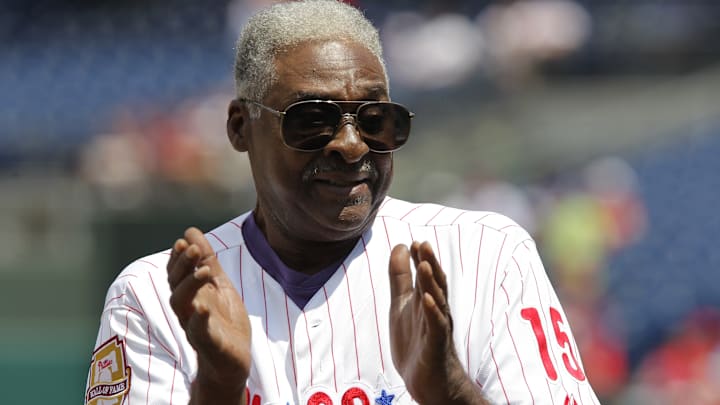A baseball injustice was righted on Sunday, finally. The late Dick Allen, a Philadelphia Phillies legend, got yet another shot at the Baseball Hall of Fame this year, and this time the voters got it right as he was elected to Cooperstown.
Allen, who spent nine seasons with the Phillies over two separate stints from 1963-69 and 1975-76, was elected with 13 of 16 votes by the Classic Baseball Era Committee at the Winter Meetings.
Allen passed away in 2020. A year later, in 2021, he was outrageously snubbed by the Golden Era committee — by one vote. It wasn't the first time, either. While alive, he was passed over during his first run of eligibility and then again on six different Veterans Committee ballots, including in 2021.
Phillies icon Dick Allen finally elected to Baseball Hall of Fame
Now finally being recognized, Allen joins one other new Hall of Fame member of the eight former players who were up for consideration this year. The other inductee is Dave Parker who was named on 14 of 16 ballots.
Welcome to Cooperstown, Dick Allen!https://t.co/KWyTX3Bh68 pic.twitter.com/4fNk4re2zr
— National Baseball Hall of Fame and Museum ⚾ (@baseballhall) December 9, 2024
Over a career that spanned 15 seasons from 1963-77, Allen amassed 58.7 bWAR, registering 1,848 hits, 351 home runs and 1,119 RBI in 1,749 games. He finished his career with a .292/.378/.534 slash line, with his .912 OPS good for a 156 OPS+.
After making his MLB debut with 10 games for the Phillies in 1963, Allen won the 1964 NL Rookie of the Year Award. The Phillies traded Allen to the St. Louis Cardinals before the 1970 season, after which he spent time with the Los Angeles Dodgers and Chicago White Sox before returning to Philadelphia for two years. He finished his career with 54 games with the Oakland Athletics in 1977.
He was a seven-time All-Star, three times as a Phillie, and won the 1972 AL Most Valuable Player Award while with the White Sox.
The Phillies honored Allen in 1994 with induction into the team's Wall of Fame and then retired his number 15 in 2020. In 1,070 games as a Phillie, he logged 1,143 hits, 204 home runs and 655 RBI with a .290/.371/.530 slash line.
Racism impacted Dick Allen's career, from the minors through his time in the majors
Allen had, at times, a tumultuous career, thanks to the racially charged culture of the 1960s, according to Bruce Markusen of the National Baseball Hall of Fame and Museum. He was also known to butt heads with management and had a tense relationship with the fans.
After dealing with death threats and obtuse racism while playing Triple-A ball in Little Rock, Arkansas, Allen considered quitting baseball altogether, per Markusen. He also wore a helmet on the field for most of his career due to the threat of projectiles from abusive fans.
But, as Markusen notes: "By the last few years of his life, Allen’s legacy in Phillies history had changed completely. He had become beloved – a revered figure throughout Philadelphia and much of Pennsylvania."
The most recent tribute to Allen in Philadelphia saw a mural created in his honor that was unveiled last December.
Now, a long-time wrong has been righted, and Phillies fans will soon be able to see Allen's plaque in the Hall of Fame.
